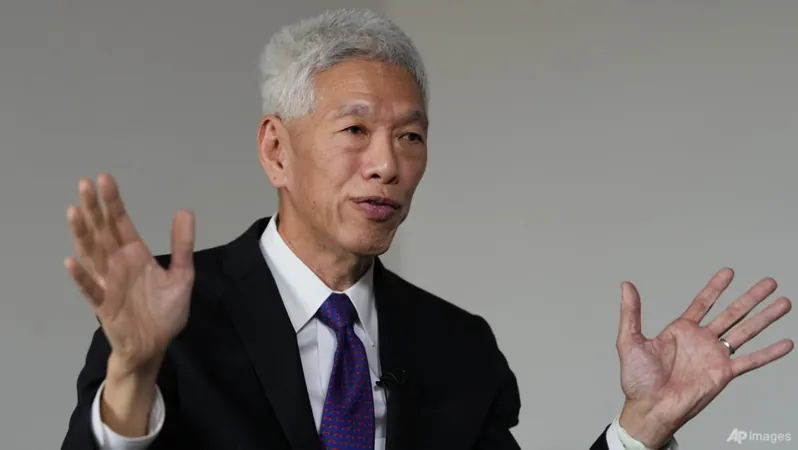
Singapore Government Accuses Lee Hsien Yang of Waging Personal Vendetta Against Nation
2024-10-31
Author: Siti
SINGAPORE: In a dramatic response to recent media interviews by Mr. Lee Hsien Yang, the son of Singapore's founding Prime Minister Lee Kuan Yew, the Singapore government has accused him of transforming a “personal vendetta” into an international smear campaign against his father, family, and the nation. This remark comes after Mr. Lee Hsien Yang's latest interview with The Associated Press, where he made claims regarding an alleged increase in repression and corruption in Singapore.
The article published by AP on October 31 featured Mr. Lee Hsien Yang expressing that the country has become considerably more oppressive since the death of his father. Accusing the government of failing to uphold accountability, he stated that corruption had worsened over the last decade.
In a strong rebuttal, the Singapore government highlighted that Lee Hsien Yang has benefited significantly from the systems established by the Singaporean governance and judicial processes. They noted that both Lee Hsien Yang and his wife, Mrs. Lee Suet Fern, had previously been found by a Disciplinary Tribunal and the Court of Three Judges to have misled their father regarding the execution of his last will, labeling his statements as lacking credibility.
The tribunal's findings included claims that they fabricated stories concerning the final wishes of Lee Kuan Yew. The ruling bodies stated that their actions involved deceit under oath. The Singapore government urged the media to present these facts to ensure that the public comprehends the full context of Lee Hsien Yang's present claims.
Further escalating tensions, the government noted that Lee Hsien Yang's asylum application in the UK included unfounded allegations of persecution by the Singapore government, claiming it was an effort to undermine his son Li Shengwu's potential political career—something Li has publicly denied.
Having sought asylum in the UK in 2022, Lee Hsien Yang characterized the move as a last refuge against ongoing government "attacks." His absence from Singapore has been underscored by his reluctance to return amidst investigation threats linked to providing false evidence concerning his father’s will.
In response to allegations of increasing political repression, the government defended Singapore's political environment, asserting that it remains the only Southeast Asian nation that consistently conducts regular elections without political upheaval or martial law. They emphasized that approximately 40% of Singaporeans choose opposition parties, indicating a healthy democratic participation.
The government reiterated that various corruption scandals, cited by Lee Hsien Yang in his statements, have been dealt with decisively. High-profile cases, including the billion-dollar money laundering operations and the infamous 1MDB scandal, have seen rigorous judicial proceedings and financial repercussions for those involved.
With continued claims of corruption highlighted in interviews from Lee Hsien Yang, the government pointed out that extensive measures have been put in place to tackle such issues, holding offenders accountable and maintaining robust anti-corruption protocols. Moreover, the commitment to integrity in Singaporean governance was affirmed with the sentencing of a former minister for graft—an act that underscored the nation’s unwavering stance against corruption.
In conclusion, the ongoing conflict between Lee Hsien Yang and the Singapore government shines a spotlight on debates surrounding political dissent, familial legacy, and accountability in governance, layered with the complexities of Singapore’s reputation on the global stage as a hub of integrity and wealth. As the saga unfolds, it remains to be seen how these accusations and the subsequent government rebuttals will shape the narrative around Singapore's political landscape.




 Brasil (PT)
Brasil (PT)
 Canada (EN)
Canada (EN)
 Chile (ES)
Chile (ES)
 España (ES)
España (ES)
 France (FR)
France (FR)
 Hong Kong (EN)
Hong Kong (EN)
 Italia (IT)
Italia (IT)
 日本 (JA)
日本 (JA)
 Magyarország (HU)
Magyarország (HU)
 Norge (NO)
Norge (NO)
 Polska (PL)
Polska (PL)
 Schweiz (DE)
Schweiz (DE)
 Singapore (EN)
Singapore (EN)
 Sverige (SV)
Sverige (SV)
 Suomi (FI)
Suomi (FI)
 Türkiye (TR)
Türkiye (TR)